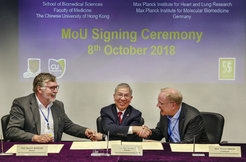Max Planck Center in China is given ‘its own four walls’
Even closer cooperation between the research groups and declaration of intent with the Chinese University of Hong Kong
Major successes for the Max Planck – GIBH Joint Center for Regenerative Biomedicine in Guangzhou: During the second annual retreat, this time held in Hong Kong, a declaration of intent was signed by the School of Biomedical Sciences of the Chinese University of Hong Kong and the Max Planck Institutes involved. But that's not all: In addition, a large laboratory will be made available to the first Max Planck Center in China in mid-2019, to be financed by the provincial government of Guangdong. This is the first time that a Max Planck Center will not only be using the existing infrastructure of its Partner Institutions, but be housed in its own laboratory.

Max Planck Centers are scientific cooperation programmes by the Max Planck Society which add a new quality to the scientific cooperations with top foreign partners in forward-looking research areas. The Max Planck Institutes involved and their international partners contribute their experiences and expertise, adding scientific value by combining complementary methods and knowledge. Existing research infrastructure is used by both parties – the Max Planck Center does not yet have its own building. In other words, it is a novelty for a Max Planck Center to be given ‘its own four walls’.
“Our Max Planck Center in China at the Guangzhou Institutes of Biomedicine and Health (GIBH) is seen as a key project for international cooperation and therefore receives priority support“, Professor Dr. Schöler reported on 29 November 2018 at a Max Planck Center Meeting of the Administrative Headquarters of the Max Planck Society in Munich.
The provincial government of Guangdong, of which Guangzhou is the capital, will invest approx. €400 million in rooms, large equipment and staff until 2020 in order to set up an Excellence Campus in Guangzhou to foster regenerative biomedicine and hence also the health economy. The new building complex, which will be called Guangdong Regenerative Medicine and Health Laboratory, will provide a large laboratory not just for the Max Planck – GIBH Joint Center for Regenerative Biomedicine. A separate laboratory will also be set up for the British stem cell pioneer Austin Smith. The aim is to turn the Guangdong Regenerative Medicine and Health Laboratory into an attractive location for top scientists from different countries across Asia and Europe.
Hans Schöler will take over the management of the Max Planck-GIBH Joint Center Laboratory. The Max Planck-GIBH Joint Center Laboratory will initially be funded for five years at €1.3 million a year. Once the laboratories at the Guangdong Regenerative Medicine and Health Laboratory are ready for use, which is expected to be the case in mid-2019, five research groups with an annual budget of EUR 640,000 each will start work at the Max Planck-GIBH Joint Center Laboratory.
“These measures will not only further intensify the good cooperation created by the Max Planck Center but also move it to a new level,” Schöler says. “The growth in international competitiveness and the addition of sustainable structures for excellent research will further increase the regional and international visibility of the Max Planck Center am GIBH. The attractiveness of the research site will attract excellent scientists from different areas and promote not a ‘brain drain’ but ‘brain circulation’!“
Now, not only the link between the GIBH and the Max Planck Institutes in Münster and Bad Nauheim will be strengthened. “At the second annual retreat of the Max Planck Center, we, the two Max Planck Institutes, signed a declaration of intent together with the School of Biomedical Sciences, Faculty of Medicine, The Chinese University of Hong Kong (CUHK-SBS). This reflects the growing activities of the Max Planck Center and will also solidify the scientific cooperation with our colleagues in Hong Kong.”
